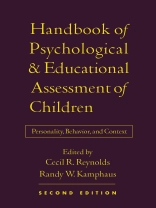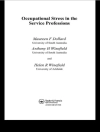The two volumes of the Handbook of Psychological and Educational Assessment of Children, Second Edition, cover all aspects of child and adolescent assessment. Leading clinical scientists summarize the state of the science of assessment paradigms, instruments, and methods. With an emphasis on practical clinical considerations, chapters also delve into issues related to test development, psychometrics, and bias. Conveniently designed for reference or text use, this vast knowledge base has been synthesized into two volumes which may be purchased separately or together. INTELLIGENCE, APTITUDE, AND ACHIEVEMENT surveys assessment of intelligence, learning styles, and academic achievement; covers historical issues and psychometric methods; and addresses diversity issues, ethical concerns, and special topics in mental testing. PERSONALITY, BEHAVIOR, AND CONTEXT reviews the use of projective methods, interviewing and observation, and objective methods of assessing personality and behavior; discusses the assessment of specific syndromes and symptoms; and presents tools for assessing adaptive skills and the family context.
Tabla de materias
I. General Issues1. Personality Assessment Research: Applying Criteria of Confidence and Helpfulness David W. Barnett, Gregg Macmann, and Francis E. Lentz, Jr.2. Procedural Issues Associated with the Behavioral Assessment of Children Christopher H. Skinner, Jennifer T. Freeland, and Edward S. Shapiro II. Projective Methods3. The Projective Hypothesis and Development of Projective Techniques for Children Louis A. Chandler4. Projective Storytelling Techniques James L. Dupree and Frances Prevatt5. Evaluation of Projective Drawings Howard M. Knoff6. The Sentence Completion as a Tool for Assessing Emotional Disturbance Ruth Adlof Haak7. Using the Rorschach with Children and Adolescents: The Exner Comprehensive System Jerry C. Allen and Jillayne Hollifield8. Use of the Holtzman Inkblot Technique (HIT) with Children Wayne H. Holtzman and Jon Swartz III. Interviewing and Observations9. Using the Clinical Interview to Assess Children’s Interpersonal Reasoning and Emotional Understanding Janet A. Welsh and Karen Lin Bierman10. Structured Diagnostic Interviewing Bryan R. Loney and Paul J. Frick11. Direct Behavioral Observation for Classrooms Anne Pierce Winsor IV. Specific Syndromes and Symptoms12. Assessment of Childhood Depression Semrud-Clikeman, Laura Bennett, and Laura Guli13. The Assessment of Attention via Continuous Performance Tests Cynthia A. Riccio and Cecil R. Reynolds14. Assessment of Attention-Deficit/Hyperactivity Disorder Shari Neul, Heather Applegate, and Ron Drabman V. Objective Methods15. Multisource and Multidimensional Object Assessment of Adjustment: The Personality Inventory for Children, Second Edition; Personality Inventory for Youth; and Student Behavior Survey David Lachar and Christian P. Gruber16. The Minnesota Multiphasic Personality Inventory–Adolescent Ellen W. Rowe17. The Behavior Assessment System for Children Jennifer Thorpe, Randy W. Kamphaus, and Cecil R. Reynolds18. The Achenbach System of Empirically Based Assessment Thomas M. Achenbach and Stephanie Mc Conaughy VI. Assessment of Adaptive Skills/Behavior19. Assessing Social Competence in Children and Adolescents Timothy A. Cavell, Barbara T. Meehan, and Samuel E. Fiala20. Adaptive Behavior Scales Randy W. Kamphaus VII. Advanced Topics21. Assessing the Family Context Cindy I. Carlson22. Issues in Child Custody Evaluation and Testimony Patrice H. Butterfield23. Assessment of Childhood Anxiety Kelly Robinson I. General Issues1. Personality Assessment Research: Applying Criteria of Confidence and Helpfulness David W. Barnett, Gregg Macmann, and Francis E. Lentz, Jr.2. Procedural Issues Associated with the Behavioral Assessment of Children Christopher H. Skinner, Jennifer T. Freeland, and Edward S. Shapiro II. Projective Methods3. The Projective Hypothesis and Development of Projective Techniques for Children Louis A. Chandler4. Projective Storytelling Techniques James L. Dupree and Frances Prevatt5. Evaluation of Projective Drawings Howard M. Knoff6. The Sentence Completion as a Tool for Assessing Emotional Disturbance Ruth Adlof Haak7. Using the Rorschach with Children and Adolescents: The Exner Comprehensive System Jerry C. Allen and Jillayne Hollifield8. Use of the Holtzman Inkblot Technique (HIT) with Children Wayne H. Holtzman and Jon Swartz III. Interviewing and Observations9. Using the Clinical Interview to Assess Children’s Interpersonal Reasoning and Emotional Understanding Janet A. Welsh and Karen Lin Bierman10. Structured Diagnostic Interviewing Bryan R. Loney and Paul J. Frick11. Direct Behavioral Observation for Classrooms Anne Pierce Winsor IV. Specific Syndromes and Symptoms12. Assessment of Childhood Depression Semrud-Clikeman, Laura Bennett, and Laura Guli13. The Assessment of Attention via Continuous Performance Tests Cynthia A. Riccio and Cecil R. Reynolds14. Assessment of Attention-Deficit/Hyperactivity Disorder Shari Neul, Heather Applegate, and Ron Drabman V. Objective Methods15. Multisource and Multidimensional Object Assessment of Adjustment: The Personality Inventory for Children, Second Edition; Personality Inventory for Youth; and Student Behavior Survey David Lachar and Christian P. Gruber16. The Minnesota Multiphasic Personality Inventory–Adolescent Ellen W. Rowe17. The Behavior Assessment System for Children Jennifer Thorpe, Randy W. Kamphaus, and Cecil R. Reynolds18. The Achenbach System of Empirically Based Assessment Thomas M. Achenbach and Stephanie Mc Conaughy VI. Assessment of Adaptive Skills/Behavior19. Assessing Social Competence in Children and Adolescents Timothy A. Cavell, Barbara T. Meehan, and Samuel E. Fiala20. Adaptive Behavior Scales Randy W. Kamphaus VII. Advanced Topics21. Assessing the Family Context Cindy I. Carlson22. Issues in Child Custody Evaluation and Testimony Patrice H. Butterfield23. Assessment of Childhood Anxiety Kelly Robinson
Sobre el autor
Cecil R. Reynolds, Ph D, is Emeritus Professor of Educational Psychology, Professor of Neuroscience, and Distinguished Research Scholar at Texas A&M University. He is an author of over 300 scholarly publications; an author or editor of over 50 books; and a creator of numerous widely used psychological tests of behavior, cognition, and personality. Dr. Reynolds maintained a clinical practice treating trauma victims and individuals with traumatic brain injury for 25 years before retiring from clinical work. He is past president of the National Academy of Neuropsychology (NAN) and the American Psychological Association (APA) Divisions of Evaluation, Measurement, and Statistics; Clinical Neuropsychology; and School Psychology. He serves on the editorial boards of 11 journals. Dr. Reynolds has been an editor or associate editor of several journals, and is currently editor-in-chief of Psychological Assessment. Dr. Reynolds has received numerous awards from NAN, APA, and other organizations. Randy W. Kamphaus, Ph D, is Professor and Head of the Department of Educational Psychology at the University of Georgia. A focus on issues related to clinical assessment has led him to pursue research in classification methods, differential diagnosis, test development, and learning disability and attention-deficit/hyperactivity disorder (ADHD) assessment. Dr. Kamphaus has served as principal investigator, coinvestigator, or consultant on federally funded research projects dealing with early intervention and prevention, child classification methods, prevalence of ADHD and conduct disorder in Latin America, and aggression reduction in schools. As a licensed psychologist and a Fellow of the American Psychological Association (APA), he has contributed extensively to his profession, and he is past president of the APA’s Division of School Psychology. Dr. Kamphaus has also authored or coauthored five books, three psychological tests, more than 40 scientific journal articles, and more than 20 book chapters. He also participates in scholarship in the field through work as an editorial board member, associate editor, test reviewer, and newsletter editor.












